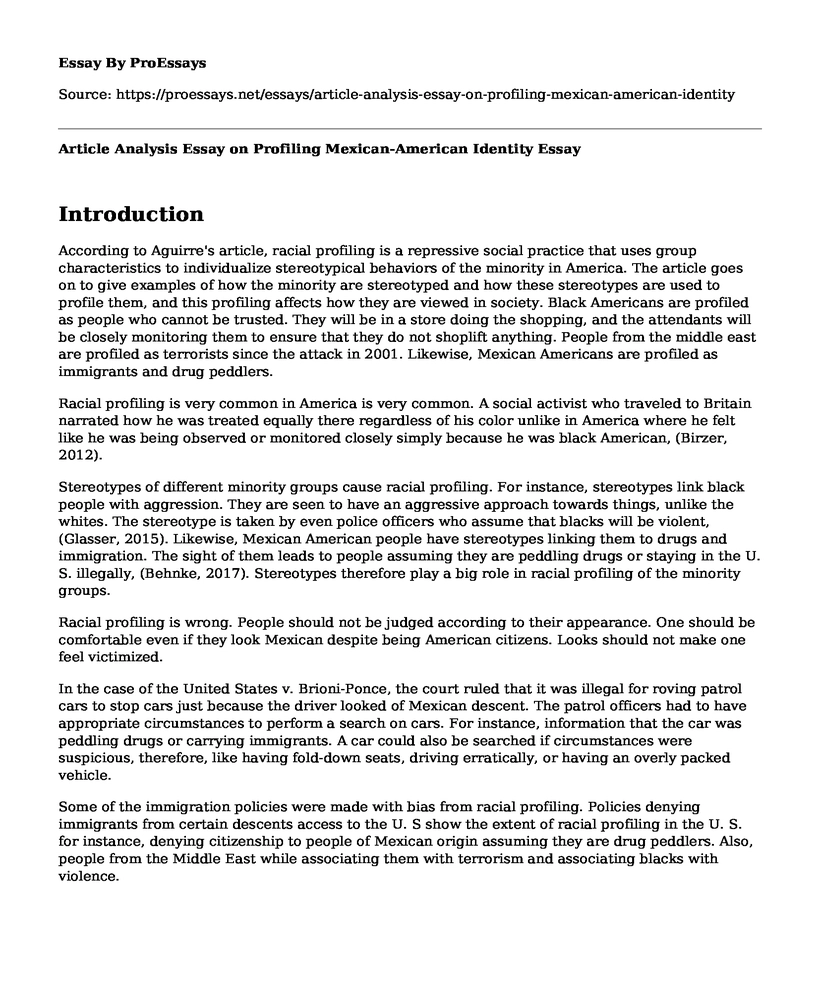Introduction
According to Aguirre's article, racial profiling is a repressive social practice that uses group characteristics to individualize stereotypical behaviors of the minority in America. The article goes on to give examples of how the minority are stereotyped and how these stereotypes are used to profile them, and this profiling affects how they are viewed in society. Black Americans are profiled as people who cannot be trusted. They will be in a store doing the shopping, and the attendants will be closely monitoring them to ensure that they do not shoplift anything. People from the middle east are profiled as terrorists since the attack in 2001. Likewise, Mexican Americans are profiled as immigrants and drug peddlers.
Racial profiling is very common in America is very common. A social activist who traveled to Britain narrated how he was treated equally there regardless of his color unlike in America where he felt like he was being observed or monitored closely simply because he was black American, (Birzer, 2012).
Stereotypes of different minority groups cause racial profiling. For instance, stereotypes link black people with aggression. They are seen to have an aggressive approach towards things, unlike the whites. The stereotype is taken by even police officers who assume that blacks will be violent, (Glasser, 2015). Likewise, Mexican American people have stereotypes linking them to drugs and immigration. The sight of them leads to people assuming they are peddling drugs or staying in the U. S. illegally, (Behnke, 2017). Stereotypes therefore play a big role in racial profiling of the minority groups.
Racial profiling is wrong. People should not be judged according to their appearance. One should be comfortable even if they look Mexican despite being American citizens. Looks should not make one feel victimized.
In the case of the United States v. Brioni-Ponce, the court ruled that it was illegal for roving patrol cars to stop cars just because the driver looked of Mexican descent. The patrol officers had to have appropriate circumstances to perform a search on cars. For instance, information that the car was peddling drugs or carrying immigrants. A car could also be searched if circumstances were suspicious, therefore, like having fold-down seats, driving erratically, or having an overly packed vehicle.
Some of the immigration policies were made with bias from racial profiling. Policies denying immigrants from certain descents access to the U. S show the extent of racial profiling in the U. S. for instance, denying citizenship to people of Mexican origin assuming they are drug peddlers. Also, people from the Middle East while associating them with terrorism and associating blacks with violence.
Conclusion
The crime rate between first- and second-generation immigrants has a significant difference. Crime in the second generation is very high as compared to the first generation. However, there is no significant difference in the crime rate between the second generation and third-generation immigrants. The second and third-generation immigrants appear to exhibit more similarities than differences.
References
Behnke, A. (2017). Racial profiling: Everyday inequality. Twenty-First Century Books (Tm).
Birzer, M. L. (2012). Racial Profiling: They Stopped Me Because I'm ----------!. CRC Press.
Glaser, J. (2015). Suspect race: Causes and consequences of racial profiling. Oxford University Press, USA.
Cite this page
Article Analysis Essay on Profiling Mexican-American Identity. (2022, Mar 24). Retrieved from https://proessays.net/essays/article-analysis-essay-on-profiling-mexican-american-identity
If you are the original author of this essay and no longer wish to have it published on the ProEssays website, please click below to request its removal:
- Crash Film - Presentation Example
- Mobile Phone Addiction Paper Example
- Essay Sample on Workplace Violence and Harassment Prevention Program
- Human Trafficking as an Epidemic - Essay Sample
- Essay Example on Drug Abuse: The Economic Cost and DEA's Role in Mitigation
- Essay Sample on Solidarity in the Face of Change: Immigrant Activism and Union Tactics
- Essay Example on Inequity in Education: Jonathan Kozol's Savage Inequalities







